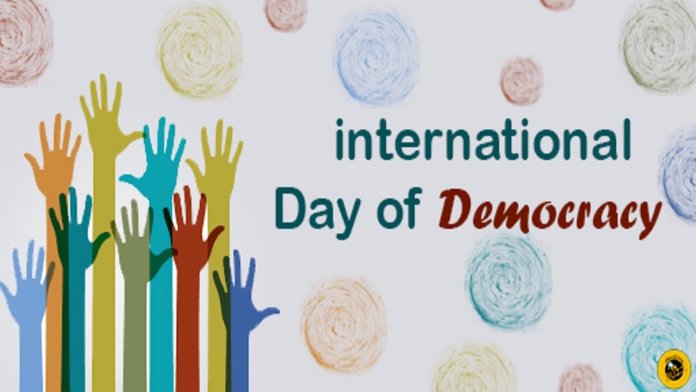With the significant democratization of countries around the world, democracy has maintained its status as the most popular form of government as compared to any other form of government till now. To celebrate this, we observe the International Day of Democracy on 15th September every year. The day serves multiple purposes like:
- helps to learn about democracy.
- To promote and uphold the principles of democracy.
- provides an opportunity to review the state of democracy in the world.
- To encourage governments to strengthen and consolidate democracy.
History of the day
The day was decided through a resolution passed by the UN General Assembly
(UNGA) in 2007. It was founded on the 20th anniversary of the First International Conference of the New or Restored Democracies. The International Day of Democracy provides an opportunity for people to participate in democracy and urges governments across the world to respect the rights of people.
The UNGA also invited all member states and organizations to observe the day by holding proper celebrations to raise public awareness. This day reminds everyone who lives in a free society to appreciate and review their democratic society so that the people don’t take their freedom for granted. A vibrant democracy demands an active citizenry.
The United Nations makes efforts to advocate for democratic societies around the world. It monitors elections, works to strengthen democratic institutions and accountability, and assists nations recovering from conflict to create their constitution. On this day, it aims to promote the government’s role in maintaining open democracy and celebrate the system of values democracy holds.
Democracy and its Basic Principles
Democracy is a form of government where the citizens have the right to vote. There are different types of democracies. Representative democracy is a system where citizens choose government representatives among their citizens. Direct democracy is when the citizens themselves form a governing body and vote directly on issues. A constitutional democracy limits the powers of government through the nation’s constitution.
The reason why democracy is celebrated is because of its principles. It gives voice to the people, upholds human rights, allows people to choose their own government, and creates a space for deliberation and discussion. Therefore, it is important to these basic principles that are:
Citizen participation, Equality, Political tolerance, Accountability, Transparency, Regular free and fair elections, Bill of rights, and Rule of law.
These are some of the most essential elements of democracy. The values of freedom, respect for human rights, and the principle of holding periodic and genuine elections by universal suffrage are necessary to be observed in a democracy.
Theme and Celebration
The theme for International Day of Democracy 2020 was “COVID-19: A Spotlight on Democracy“. As each and every country is fighting the pandemic, it was also important that they uphold the rule of law and the right to access justice with due process of law and do not dismiss democratic principles while imposing restrictions during the pandemic.
The day is celebrated vividly across different corners of the world. Both governments and civil society organizations hold special events to promote democracy initiatives. Meetings and discussions are held. Eminent speakers are called to address the discussions.
On this day, the role of educators is also very significant. People serving in the education field like professors, teachers, lecturers, etc., play a crucial role in strengthening democracy in any country. Educational institutions hold special programs to propagate democratic principles. People use placards, posters, charts, banners, public display boards, etc., to commemorate the day.
Global campaigns, e-campaigns, and online surveys are also conducted as part of various chosen themes.
How many countries are democratic at present?
According to the World Forum on Democracy, electoral democracies now represent 120 of the 192 existing countries and constitute 58.2 percent of the world’s population. Norway tops the list as the most democratic country in the world in the Democracy Index Report. India stands at 53rd position according to the 2020 report.
Out of 167 countries, the Democracy Index has classified 23 countries as full democracies, 52 as flawed democracies, 35 as hybrid regimes, and 57 as authoritarian regimes. India has been classified as a ‘flawed democracy’ along with countries such as the U.S., France, Belgium, and Brazil.
With the impact of the pandemic, it has now become more crucial than ever to celebrate the day as it has forced democratic principles to retreat back which is not a healthy sign for global democracy. This day marks the need to check unnecessary breaches of democratic principles and remind ourselves of our duties as the citizens of a democracy.
We hope the article was helpful to you.
Thank You!




